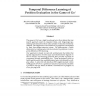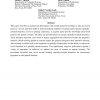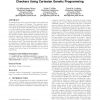115 search results - page 19 / 23 » Fractal board games |
NIPS
1993
13 years 8 months ago
1993
The game of Go has a high branching factor that defeats the tree search approach used in computer chess, and long-range spatiotemporal interactions that make position evaluation e...
CONSTRAINTS
1998
13 years 7 months ago
1998
This paper describes an architecture that begins with enough general knowledge to play any board game as a novice, and then shifts its decision-making emphasis to learned, game-sp...
MST
2006
13 years 7 months ago
2006
The board game FragmindTM poses the following problem: The player has to reconstruct an (unknown) string s over the alphabet . To this end, the game reports the following informati...
CEC
2005
IEEE
14 years 1 months ago
2005
IEEE
Abstract- We present experiments (co)evolving Go players based on artificial neural networks (ANNs) for a 5x5 board. ANN structure and weights are encoded in multi–chromosomal g...
GECCO
2008
Springer
13 years 8 months ago
2008
Springer
A developmental model of neural network is presented and evaluated in the game of Checkers. The network is developed using cartesian genetic programs (CGP) as genotypes. Two agent...




